
The UK should join a pan-European agreement on goods trade to limit the damage to its car industry from looming post-Brexit tariffs instead of seeking a delay to their introduction, according to senior officials in Brussels.
From next January, electric vehicles shipped between the UK and the EU will need to have at least 45 per cent of their parts sourced from within the two regions or face 10 per cent tariffs under “rules of origin” terms set out in their post-Brexit trading agreement.
The limit rises to 60 per cent for batteries, which make up a significant part of the value of an EV, and is particularly problematic as the UK and EU still import many from China, South Korea or Japan.
London wants the EU to delay introduction of the levy until 2027. The move is backed by carmakers in the UK and EU, which have warned they will not be able to comply with “rules of origin” from next January due to the lack of battery manufacturing capacity in Europe.
But two senior officials in Brussels said they would instead encourage the UK to sign up to an existing pact among more than 20 other European, Middle Eastern and north African countries that treats goods assembled in one country from parts made in another signatory state as originating in the exporting country, thereby avoiding tariffs and quotas.
Here’s what else I’m watching in the days ahead:
-
Economic data: France releases April industrial production figures today, and US data is expected to show that jobs growth cooled last month.
-
Shangri-La Dialogue: The security forum runs until Sunday in Singapore, with defence chiefs of the US and China expected to speak separately after Beijing declined a meeting between both leaders.
-
World Bank: Former Mastercard chief executive Ajay Banga starts a five-year term as president today.
Five more top stories
1. The US Senate passed the debt ceiling bill with overwhelming bipartisan support yesterday night, approving a fiscal deal between the White House and congressional Republicans to end a weeks-long political stand-off that risked triggering an unprecedented debt default in the world’s largest economy. The bill now heads to President Joe Biden for his signature.
2. Exclusive: The west must “take account” of Russian president Vladimir Putin’s security concerns and stop the slide towards a Versailles-style victors’ peace in Ukraine, said Brazil’s top foreign policy adviser and former foreign minister. Read the full Financial Times interview with Celso Amorim.
3. Nvidia is one of the few companies that will sustain this year’s rebound in US stocks even as rapid advances in artificial intelligence “creates more losers than winners”, according to one of the biggest recent buyers of the chipmaker’s shares. Read more from GQG Partners founder Rajiv Jain’s remarks.
4. Binance has lost a quarter of its market share in the past three months. It controls 43 per cent of the average monthly volume on global cryptocurrency exchanges, down from 57.5 per cent in February, according to research provider CCData. Here’s why the word’s largest crypto exchange has experienced the sharp decline.
5. The UK government-backed Pension Protection Fund has slashed its exposure to equities by one-third and moved money into infrastructure and forestry, as it tries to protect itself against persistently high inflation. The £39bn fund’s chief investment officer explains his move to the FT.
How well did you keep up with the news this week? Take our quiz.
The Big Read

When Joe Biden took office, there was some concern that he might adopt a weaker approach on China than his predecessor Donald Trump, who took a much sharper position than previous US presidents. But Biden has taken an unexpectedly tough stance, stepping up security initiatives to boost deterrence and better prepare for potential conflict over Taiwan. Here’s how the US is deepening military alliances in China’s backyard.
We’re also reading . . .
Chart of the day
Figures from the Nationwide Building Society yesterday showed average UK property prices last month were 3.4 per cent lower than a year earlier, with separate data from the Bank of England showing households reduced overall mortgage debt by a near-record high of £1.4bn in April.
Take a break from the news
Few artists have probed the illusions of identity like Cindy Sherman, who made her reputation in the 1970s with the “Untitled Film Stills” series featuring photographs of jilted lovers and careworn starlets from lost Hitchcock or Antonioni films. See her newest work, shared exclusively with the FT.

Additional contributions by Vita Dadoo Lomeli and Ben Wilhelm






